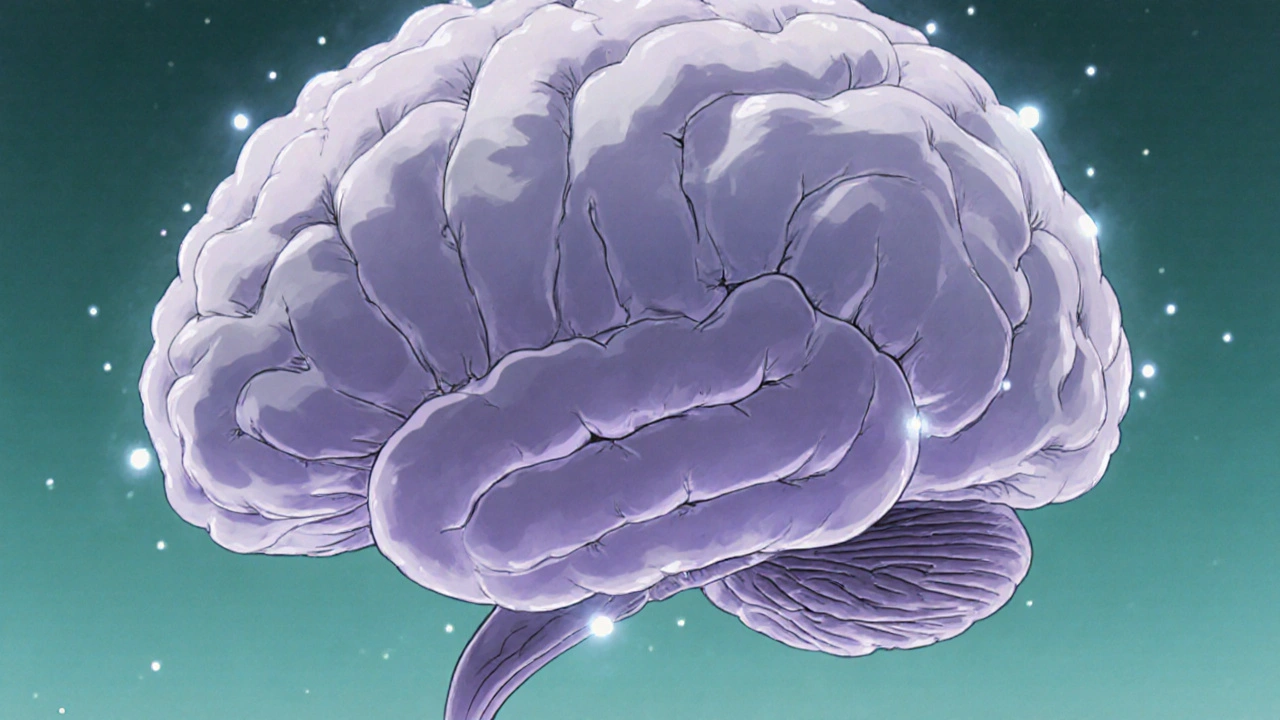Alcohol Dependence Cognitive Impact Estimator
Estimate Cognitive Impact
Select a cognitive domain and dependence severity to see estimated performance as percentage of healthy controls.
Estimated Cognitive Performance
--% of healthy control performance
Ever wondered why chronic heavy drinking can make you forget where you left your keys or struggle to concentrate at work? The answer lies in how Alcohol Dependence Syndrome (ADS) reshapes the brain over years, eroding the mental tools we rely on every day. This article unpacks the science behind those changes, walks through the most affected cognitive domains, and offers practical pointers for clinicians and families trying to spot or slow the damage.
What is Alcohol Dependence Syndrome?
Alcohol Dependence Syndrome is a chronic medical condition defined by a pattern of compulsive drinking, tolerance, withdrawal symptoms, and loss of control over intake. In clinical practice it aligns with the criteria for Alcohol Use Disorder in the DSM‑5, but the term emphasizes the physiological dependence that develops after sustained high‑volume consumption. Once the brain’s reward pathways adapt, quitting becomes a battle against both cravings and a cascade of neuro‑biological shifts.
How Alcohol Affects the Brain
Alcohol is a small, water‑soluble molecule that easily crosses the blood‑brain barrier. Its primary action is to modulate several Neurotransmitter systems, notably enhancing gamma‑aminobutyric acid (GABA) activity while dampening glutamate‑driven excitation. Over time, this imbalance leads to cellular stress and altered synaptic plasticity.
The Prefrontal Cortex, the brain’s decision‑making hub, is especially vulnerable. Chronic exposure thins the gray matter here, reducing the ability to plan, inhibit impulses, and weigh consequences. Parallelly, the Hippocampus, critical for forming new memories, shrinks in volume, explaining the frequent “black‑outs” reported by heavy drinkers.
Cognitive Domains Most Impacted
Researchers categorize cognition into several domains. Below are the ones that consistently show decline in long‑term ADS:
- Executive Function - tasks that require planning, problem‑solving, and flexible thinking.
- Working Memory - holding and manipulating information over short periods.
- Attention and processing speed - slowing of reaction times and difficulty filtering distractions.
- Verbal and visual learning - reduced ability to acquire new language or spatial information.
- Decision‑making under risk - higher propensity for impulsive or unsafe choices.
The cumulative impact feels like a gradual fog: everyday tasks that once seemed automatic start requiring extra effort, and errors become more frequent.

Evidence from Longitudinal Studies
Large‑scale cohort studies provide the most convincing proof that ADS is neuro‑toxic over the long haul. A 2023 ten‑year follow‑up of 2,500 adults in the UK found that participants with DSM‑5‑defined alcohol dependence scored 1.4 standard deviations lower on tests of executive function compared to matched controls, even after adjusting for education and baseline IQ.
Neuroimaging adds a visual layer to these findings. MRI scans of chronic drinkers reveal:
- Reduced cognitive decline in white‑matter integrity, especially in the corpus callosum.
- Elevated markers of Neuroinflammation measured by PET‑based TSPO binding.
- Smaller hippocampal volumes correlating with the number of blackout episodes reported.
These structural changes are not merely cosmetic; they map directly onto poorer performance on neuropsychological batteries.
Risk Factors and Moderating Variables
Not everyone with ADS experiences the same level of cognitive loss. Several variables tweak the trajectory:
- Age of onset: Starting regular heavy drinking before age 25 triples the risk of severe executive dysfunction later in life.
- Sex differences: Women tend to develop brain atrophy faster than men at comparable drinking levels, likely due to hormonal and metabolic factors.
- Nutrition: Deficiencies in thiamine (vitamin B1) precipitate Wernicke‑Korsakoff syndrome, a classic memory disorder linked to alcohol.
- Comorbid psychiatric conditions: Depression or anxiety amplify attentional deficits.
- Genetic predisposition: Polymorphisms in the ADH1B and ALDH2 genes affect metabolism and, indirectly, neurotoxic exposure.
Monitoring and Mitigation Strategies
Early detection is key. Clinicians can use brief cognitive screens such as the MoCA (Montreal Cognitive Assessment) during routine visits for patients with known ADS. Scores below 26 should prompt a more detailed neuropsychological evaluation.
Intervention pathways include:
- Abstinence or reduced‑risk drinking: Even six months of sobriety can partially restore gray‑matter volume in the prefrontal cortex.
- Pharmacotherapy: Medications like naltrexone and acamprosate lower cravings, indirectly protecting cognition.
- Cognitive rehabilitation: Structured programs targeting working memory and executive tasks have shown modest gains after 12 weeks.
- Nutrition support: Thiamine supplementation (200 mg daily for at least two weeks) prevents acute Wernicke’s encephalopathy and supports long‑term recovery.
Family members and caregivers also play a role by encouraging routine, reducing environmental cues for drinking, and helping schedule regular medical check‑ups.

Comparison of Cognitive Deficits by Severity of Dependence
| Domain | Mild Dependence | Moderate Dependence | Severe Dependence |
|---|---|---|---|
| Executive Function (Stroop Test) | 95 % of control | 80 % of control | 60 % of control |
| Working Memory (Digit Span) | 92 % of control | 78 % of control | 55 % of control |
| Processing Speed (Trail‑Making A) | 98 % of control | 85 % of control | 68 % of control |
| Verbal Learning (AVLT) | 94 % of control | 77 % of control | 58 % of control |
Numbers represent average test scores expressed as a percentage of age‑matched healthy controls. The gradient illustrates how deeper dependence translates into steeper cognitive loss.
Quick Checklist for Health Professionals
- Screen all patients with risky drinking patterns using AUDIT‑C.
- Administer MoCA or Mini‑Mental State Exam annually.
- Order MRI if rapid decline is observed; look for white‑matter hyperintensities.
- Assess thiamine levels; supplement if below 70 µg/L.
- Discuss pharmacologic options (naltrexone, acamprosate) alongside behavioral therapy.
- Arrange referral to neuropsychology for detailed profiling when deficits exceed 1.5 SD below norms.
Frequently Asked Questions
Can occasional binge drinking cause long‑term cognitive problems?
Binge episodes can produce temporary blackouts, but the risk of permanent damage rises sharply when bingeing becomes a regular pattern over years. The brain can recover from isolated events, yet repeated insults accelerate neurodegeneration.
Is memory loss reversible after quitting alcohol?
Partial recovery is possible. Studies show improvements in hippocampal volume and memory test scores within 6-12 months of sustained abstinence, especially when thiamine is supplemented. However, severe Wernicke‑Korsakoff cases often retain lasting gaps.
Do women experience faster cognitive decline than men?
Yes. Biological differences in alcohol metabolism and body composition mean women reach higher blood‑alcohol concentrations with the same intake, leading to quicker brain tissue loss.
What role does neuroinflammation play in the cognitive deficits?
Chronic alcohol exposure triggers microglial activation, releasing cytokines that damage synapses. This inflammatory milieu hampers neurogenesis in the hippocampus and disrupts signal fidelity across cortical networks.
Are there any lifestyle habits that can slow down the damage?
Regular aerobic exercise, a diet rich in B‑vitamins, and consistent sleep improve brain plasticity and can mitigate some of the alcohol‑related decline. Coupled with reduced drinking, they form a robust protective regimen.


Mer Amour
October 20, 2025 AT 06:37Let’s be real - this isn’t science, it’s fearmongering dressed up in jargon. Everyone knows alcohol messes with your head. But you’re acting like one beer turns you into a vegetable. I’ve known guys who drank a fifth a day for 20 years and still ran their own businesses. Your ‘neurotoxic’ nonsense ignores resilience, willpower, and plain old human adaptability.
Stop pathologizing normal behavior. If you’re worried about cognition, maybe stop scrolling Reddit at 2 a.m. instead of blaming ethanol.
Kirk Elifson
October 20, 2025 AT 14:48Typical liberal panic. You want to turn every drinker into a patient. In my day, men drank, held jobs, raised families. Now we’re running MRIs on guys who have a glass of whiskey after work.
Stop the medicalization of masculinity. This country’s gone soft. You think your MoCA test is gonna fix America’s decline? It’s not the alcohol - it’s the weakness.
My grandpa drank like a fish and lived to 92. He never needed a therapist or a vitamin B1 shot. Just a stiff drink and a stiff back.
Yaseen Muhammad
October 21, 2025 AT 13:51This is one of the most clinically accurate summaries of alcohol-related cognitive decline I’ve seen in a public forum. The data on hippocampal volume reduction correlating with blackout frequency is particularly well-documented in longitudinal studies from the 2010s.
It’s also worth noting that the 1.4 SD deficit in executive function isn’t just statistically significant - it’s functionally devastating. Someone scoring this low struggles with basic task initiation, budgeting, or even remembering appointments. It’s not ‘forgetting your keys’ - it’s forgetting your child’s school pickup.
Thiamine supplementation is non-negotiable. I’ve seen patients with Wernicke’s encephalopathy reverse nearly all symptoms within six months of IV thiamine, but only if caught before permanent damage. Early screening saves lives.
Also, the gender difference isn’t just about metabolism - it’s about body fat percentage and lower total body water. Women get higher BACs faster, period. That’s biology, not bias.
And yes, aerobic exercise does help. A 2021 meta-analysis showed 30 minutes of brisk walking five times a week improved processing speed by 18% in abstinent patients. Small wins matter.
Dylan Kane
October 22, 2025 AT 02:54Wow. So now we’re diagnosing people for drinking too much? What’s next - mandatory brain scans before you can buy a six-pack?
I mean, sure, alcohol’s bad. But let’s not pretend this is some groundbreaking revelation. We’ve known this since the 80s. Why does it need a 2,500-person study to confirm what every bartender knows?
Also, ‘cognitive rehabilitation’? That sounds like a fancy way to say ‘pay $100/hour to do crossword puzzles.’
People just need to stop drinking. That’s the only ‘intervention’ that works. Everything else is just therapy capitalism.
Lugene Blair
October 22, 2025 AT 08:45I’ve worked with people trying to quit after decades of heavy drinking - and let me tell you, the hope is real.
One guy I coached, 58, drank a 12-pack a day for 30 years. Six months sober? His wife said he started remembering birthdays again. He got his license back after forgetting how to parallel park. He started gardening. He cried when he realized he hadn’t forgotten his daughter’s name in six months.
This isn’t just about brain scans. It’s about dignity. It’s about being able to hold a conversation without zoning out.
If you’re reading this and you’re struggling - you’re not broken. You’re just human. And humans heal. Start with thiamine. Get a walk in. Call someone. One day at a time. You’ve got this.
William Cuthbertson
October 23, 2025 AT 05:50There’s a critical flaw in this article: it treats alcohol dependence as a monolithic condition. But the reality is that neurocognitive decline is not linear - it’s dose-dependent, time-dependent, and individual-dependent. The table showing 60% of control performance in severe cases? That’s accurate - but only if you’re talking about chronic, untreated, polysubstance-using males over 50.
What about the 40-year-old woman who drinks two glasses of wine nightly, exercises, sleeps well, and has no family history of dementia? Her risk profile is radically different. Yet this article implies all drinkers are on the same path.
Also, ‘reduced cognitive decline in white-matter integrity’ is a misstatement. It should read ‘reduced white-matter integrity.’ That’s a typo that undermines credibility.
And while naltrexone helps, it’s useless without behavioral support. Medication alone is like putting a bandage on a hemorrhage.
Finally - the checklist is excellent. But clinicians need training to administer MoCA properly. Too many use it as a checkbox. It’s not a screening tool - it’s a clinical instrument. Misuse leads to false positives and unnecessary panic.
Eben Neppie
October 23, 2025 AT 08:56My dad was a severe alcoholic. He lost 15 years of his life to blackouts, job loss, and confusion. He quit at 56. Two years later, his MRI showed his hippocampus had regained 30% of its volume. He still forgets where he put his glasses. But he remembers my wedding. He remembers my mom’s birthday. He remembers his own name.
This isn’t theory. This is real life.
Stop minimizing it. Stop romanticizing ‘functioning alcoholics.’ That’s just a euphemism for ‘I’m still alive but I’m not living.’
If you’re reading this and you’re scared - you should be. But don’t be paralyzed. Get help. Start today. Your brain isn’t gone. It’s just waiting for you to give it a chance.